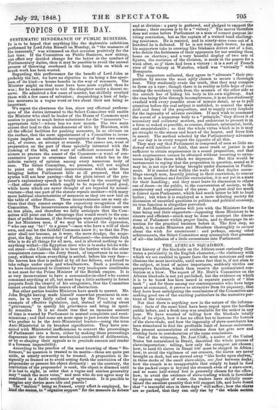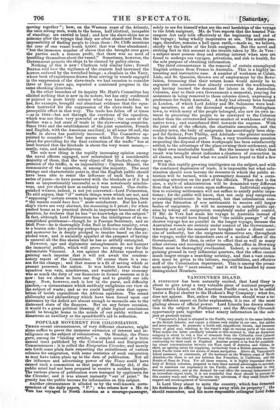THE AFRICAN SQUADRON.
THE history of the blockade on the African coast curiously illus- trates a peculiarity in the English character,—the obstinacy with which we are enabled to ignore facts the most notorious and con- clusions the most inevitable, until some fact that is, if not alien to the subject, at least of minor importance, suddenly vivifies our perceptive faculties, which then receive the accumulated con- viction at a blow. The report of Mr. Hutt's Committee on the African blockade is not yet published, but the evidence on which it is to be balsa has been issued in separate parcels of " blue book " ; and for those among our contemporaries who have large space at command, it proves so attractive from its piquancy, that they have been anticipating the conclusions of the Committee and making good use of the exciting particulars in the narrative por- tions of the volumes.
Not that there is anything new in the nature of the informa- tion: facts of the same kind have been urged upon the heedless public before, and a fresh crop was available for the seeker in any year. We have wearied of telling how the blockade totally fails of its object, how it has no effect but to increase the horrors of the slave-trade, and how the ingenuity of slave-merchants has been stimulated to find the profitable limit of human endurance. The present accumulation of evidence does but give new anti striking facts in corroboration of the same conclusions.
One of the witnesses, Dr. Jose Cliffe, a native of the United States but naturalized in Brazil, described the whole process of slave-importation: telling, how only the strongest are chosen ; how, to land 65 slaves in Brazil 100 must be shipped in Africa ; how, to avoid the vigilance of our cruisers, the slaves are never brought on deck, but are stowed away "like books upon shelves," in three decks of the small slave-ships, one foot between decks; how the stench is so insupportable that simply to hand in food to the packed cargo is beyond the stomach even of a slave-crew, and so some half-witted fool is generally chosen for the office; how, to avoid the evidence of slave-trading which is furnished by copious supplies of water, the traders have skilfully ascer- tained the smallest quantity that will support life, and have found that "a teacupful once in three days" will suffice; bow the slaves are so packed, that they can only rise by "the whole section moving together "; how, on the Western coast of the Atlantic, the once strong men, worn to the bones, half idiotical, incapable of standing, are carried to land ; and how the slave-ships are so noisome after the voyage that they are often abandoned from the impossibility of finding people to clean them : Dr. Cliffe mentions the case of one vessel worth 9,000/. that was thus abandoned ; "but the immense number of slaves that she brought over gave the parties such a famous profit, that there was no need of troubling themselves about the vessel." Sometimes, however, the Government permits the ships to be cleaned by galley-slaves. Nothing of this is new : Clarkson told similar tales ; Fowell Buxton told how the vigilance of the cruisers had increased the horrors endured by the wretched beings ; a chaplain in the Navy, whose book of experiences drawn from serving in vessels engaged in the suppression of the slave-trade we had occasion to consider three or four years ago, reported a continued progress in the same shocking direction. In the other branches of its inquiry Mr. Hutt's Committee has elicited nothing that is new in its nature, but has only confirmed or painted in more lively colours what was known before. It has, for example, brought out abundant evidence that the squa- dron instituted for the suppression of the slave-trade has no perceptible effect in that way. The trade has fallen off at times —as in 1844—but not through the exertions of the squadron, which was not then very powerful or efficient ; the cause of the decline was a bad state of trade in the slave-owning countries. Since 1845 and the establishment of the joint squadron, French and English, with the American auxiliary, in all some 56 sail, the traffic in slaves has positively increased. The Committee ap- pointed to consider "the best means which Great Britain can adopt for providing for the final extinction of the traffic" has at least learned that the blockade is about the very worst means,— costly, vain, and mischievous.
The sole new thing is the rapidly increasing opinion among the naval officers engaged, now entertained by a considerable majority of them, that the very object of the blockade, the sup- pression of the traffic, is an impossibility : Captain Manse!, the commander of the squadron, is among the majority. The most strange and characteristic point is, that the English public should have been able to resist the influence of such facts for a series of years—to have persevered with the blockade as if it had been as unquestionably successful as it was notoriously mischie- vous, and yet should now as suddenly turn round. One distin- guished witness, indeed, is not yet converted—Lord Palmerston. He still argues, that "if" certain things were which are not, and "supposing" certain events to happen which do not happen, then " the results would have been" more satisfactory. But his Lord- ship's views are very abstract, his reasoning is a priori ; for when pushed home as to practical details in important branches of the question, he declares that he has "no knowledge on the subject." In fact, although Lord Palmerston has the intelligence of an ac- complished gentleman—though he is Foreign Secretary, and an Irish Peer—he is thoroughly John Bull in fearless tenacity, even to a beaten side: he is growing perhaps a little too old for change; and moreover he is deeply pledged to treaties based on the ex- ploded view, and is naturally appalled at the prospect of having to unravel all the fine skeins that he has so artfully entangled. However, age and diplomatic entanglements do not hamper the immortal public, which will prove too strong even for the indomitable Viscount. A run against the African squadron is gaining such impetus that it will not await the condem- natory report of the Committee. Of course there is a rea- son for the change ; and that reason is a fit of saving which at present possesses the nation. It was before known that the squadron was vain, mischievous, and wasteful ; true economy was as much the duty of our financiers in former sessions as it is now : but we chose to have our fling and to gratify our idle fancy. Now, however, cash is low in the purse, and difficulty pinches,—a circumstance which suddenly enlightens our view on the subject of waste ; and so we could hardly miss that oppro- brium of lavish expenditure the African squadron. The sound philosophy and philanthropy which have been forced upon our statesmen by the deficit are almost enough to reconcile one to the distressed state of the finances. But on any future occasion, it would be a great political blessing if plain logical conclusions could be brought home to the minds of our public without so disastrous an auxiliary as the spendthrift's aid to reflection.



























 Previous page
Previous page